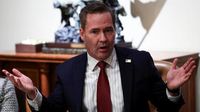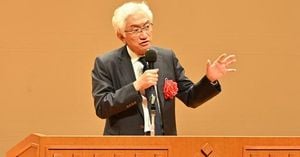U.S. President Donald Trump has officially ousted his National Security Adviser Mike Waltz, marking the first significant shakeup in his administration since he took office in January 2025. This decision follows a series of controversies surrounding Waltz, including a scandal involving a messaging app that led to heightened scrutiny from within the White House.
Trump announced the change on May 1, 2025, stating he would nominate Waltz to become the next U.S. ambassador to the United Nations, emphasizing that "he has worked hard to put our nation's interests first." In the interim, Secretary of State Marco Rubio has been appointed to take over Waltz's duties, a move that is historically significant as it is the first time since Henry Kissinger in the 1970s that one individual will simultaneously hold both positions.
Waltz's departure comes amid internal turmoil within the Trump administration, particularly after he was implicated in a scandal involving the accidental inclusion of a journalist in a classified group chat on the encrypted messaging app Signal. The chat contained sensitive information regarding U.S. military operations, including plans for airstrikes against the Iran-backed Houthi militant group in Yemen. This incident raised serious concerns about Waltz’s judgment and ability to maintain operational security, leading to a loss of confidence from other senior officials.
During a cabinet meeting shortly after the Signal incident, Trump expressed his discontent with Waltz's handling of sensitive discussions, indicating a preference for conducting such conversations in more secure settings. Despite initial assurances of support from Trump following the scandal, Waltz's influence within the White House had been dwindling.
In the days leading up to his dismissal, speculation about Waltz's future intensified. Sources revealed that Deputy National Security Adviser Alex Wong, who was also involved in the Signal chat controversy, would be leaving his position alongside Waltz. Wong, an Asia expert previously focused on North Korea, has faced criticism over his role in the administration.
Trump's decision to remove Waltz is indicative of a broader pattern of instability within the National Security Council (NSC). The White House has been rife with discussions about potential replacements for Waltz, with names like Steve Witkoff, a close ally of Trump and special envoy for Middle East negotiations, emerging as a leading candidate. Witkoff has been instrumental in various diplomatic efforts, including negotiations regarding the Israel-Hamas conflict and discussions with Iran over its nuclear program.
However, sources suggest that Witkoff may not be interested in taking on the role of National Security Adviser, as he prefers to focus on his current responsibilities rather than managing the complexities of the NSC. This reluctance raises questions about who will ultimately fill the position and how the administration will navigate its foreign policy challenges moving forward.
Waltz's ousting has drawn mixed reactions from lawmakers and political analysts. Some Democrats have criticized Trump for not holding Defense Secretary Pete Hegseth accountable for his own missteps, particularly regarding the sharing of sensitive information. Arizona Senator Mark Kelly remarked that Waltz's inclusion of a journalist in the Signal chat was an "unfortunate mistake," but he found it more troubling that Hegseth had shared classified details with family members.
As Waltz exits, the Trump administration faces increased scrutiny over its national security strategy and the effectiveness of its leadership team. The ongoing conflicts in the Middle East, particularly in Gaza and Ukraine, as well as tensions with Iran, demand cohesive and competent management from the NSC. Observers note that Waltz's departure could further complicate diplomatic efforts, especially if his replacement is not adequately prepared to navigate the intricacies of international relations.
Waltz, a former Republican congressman from Florida, had previously served on the House Armed Services Committee. His rise to the role of National Security Adviser was seen as a significant achievement, but his tenure has been marred by controversies and internal conflicts. The administration's decision to replace him reflects a desire for a fresh approach to national security, particularly as Trump seeks to project strength and decisiveness in his second term.
In conclusion, the shakeup within the Trump administration highlights the challenges faced by the National Security Council as it grapples with ongoing global conflicts and the need for effective leadership. As the administration looks to stabilize its foreign policy apparatus, the appointment of a new National Security Adviser will be crucial in shaping the direction of U.S. diplomacy in a rapidly changing world.






